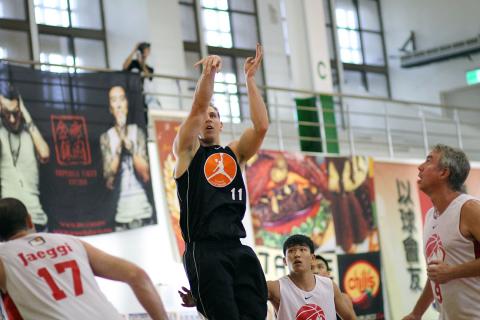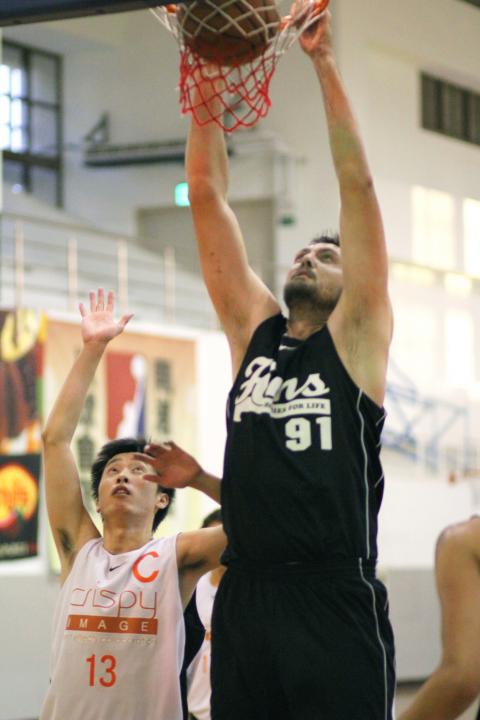When most athletes finish high school or college, it’s the end of the line for their sporting careers. Only a small percentage of the most gifted ones go on to become professionals in their field, while the others tend to take great pleasure in reminiscing about how good their glory days used to be. Sean Cheng (鄭鑫), co-founder and commissioner of the Glory Days Basketball (GDB) league, came up with the idea for a basketball league late one night two years ago.
“In my dream, I was David Stern of a league that was just like the NBA — but for the average Joe who still loves to play and play hard,” Cheng said.
“All athletes want to perform at the highest level and show the entire world that they can do it, or still do it. GDB is a place where people can relive that dream every weekend and share this experience with all of their friends and family.”

Photo courtesy of Glory Days Basketball
Cheng woke up and told his wife and co-founder, Jess Cheng, his idea, and they were off to the races.
“Our first game had two teams, two refs, two scorekeepers, one videographer, and one photographer in the upper gym of the Taipei American School,” Jess Cheng said.
“Today we have over 35 teams, over 20 staff members with games located in three different top-notch gyms in Taipei City.”

Photo courtesy of Glory Days Basketball
GDB’s rapid growth can be attributed to their weekly Facebook postings of pictures and highlight videos, their new non-profit status, working closely with the Ministry of Foreign Affairs and of course, Jeremy Lin (林書豪).
“Linsanity introduced an entirely new fan base to the game of basketball, young and old,” Jess Cheng said.
“Our players still play just as hard, but I think their love for basketball is appreciated by the general public 100-fold. This means that a lot more friends and family members show support, whether in person or on Facebook.”
This Sunday, GDB will be partnering with Nike to run a three-on-three tournament at the Ximending movie park basketball courts, and then have a two-game exhibition with the top four teams in the league. This means that two years of hard work is finally paying off for the Chengs.
“GDB is more than just a full time job for us now. It’s a part of who we are,” Jess Cheng said.
Sean Cheng added, “I think there’s a lot of people, not just in Taiwan, that want their glory days back and that’s why we are where we are today.”

April 28 to May 4 During the Japanese colonial era, a city’s “first” high school typically served Japanese students, while Taiwanese attended the “second” high school. Only in Taichung was this reversed. That’s because when Taichung First High School opened its doors on May 1, 1915 to serve Taiwanese students who were previously barred from secondary education, it was the only high school in town. Former principal Hideo Azukisawa threatened to quit when the government in 1922 attempted to transfer the “first” designation to a new local high school for Japanese students, leading to this unusual situation. Prior to the Taichung First

Chinese Nationalist Party (KMT) Chairman Eric Chu (朱立倫) hatched a bold plan to charge forward and seize the initiative when he held a protest in front of the Taipei City Prosecutors’ Office. Though risky, because illegal, its success would help tackle at least six problems facing both himself and the KMT. What he did not see coming was Taipei Mayor Chiang Wan-an (將萬安) tripping him up out of the gate. In spite of Chu being the most consequential and successful KMT chairman since the early 2010s — arguably saving the party from financial ruin and restoring its electoral viability —

The Ministry of Education last month proposed a nationwide ban on mobile devices in schools, aiming to curb concerns over student phone addiction. Under the revised regulation, which will take effect in August, teachers and schools will be required to collect mobile devices — including phones, laptops and wearables devices — for safekeeping during school hours, unless they are being used for educational purposes. For Chang Fong-ching (張鳳琴), the ban will have a positive impact. “It’s a good move,” says the professor in the department of

Article 2 of the Additional Articles of the Constitution of the Republic of China (中華民國憲法增修條文) stipulates that upon a vote of no confidence in the premier, the president can dissolve the legislature within 10 days. If the legislature is dissolved, a new legislative election must be held within 60 days, and the legislators’ terms will then be reckoned from that election. Two weeks ago Taipei Mayor Chiang Wan-an (蔣萬安) of the Chinese Nationalist Party (KMT) proposed that the legislature hold a vote of no confidence in the premier and dare the president to dissolve the legislature. The legislature is currently controlled